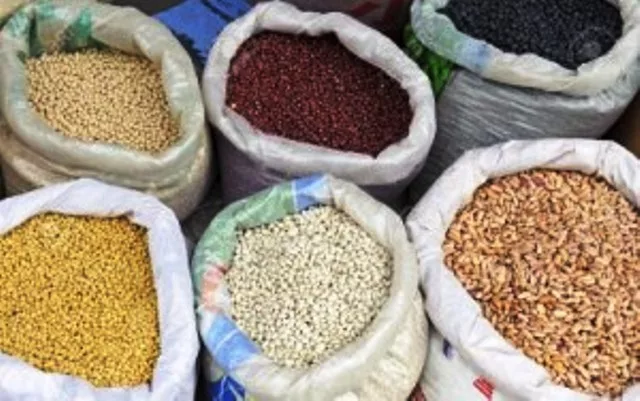How Much is a Bag of Beans in Nigeria (July, 2024 Prices)
Are you interested in knowing how much is a bag of beans in Nigeria currently? If you answer yes to this question, read on. This article is for you as it will unveil to you, the price of a bag of beans in the country this 2024.

Beans is one of the most popular foods in Africa. The situation and the love for beans in Nigeria is a special one. In Nigeria, beans is regarded as the 4th most consumed crop after cassava, yam, and rice. The Northern part of the country takes the lead when it comes to the cultivation of beans in the country. In terms of quantity cultivated in the country, more of brown beans than black-eyed beans are abundantly cultivated.
Nigerians are known to be on top of the chart when it comes to the consumption of beans in the world. In fact, it is stated that Nigeria is the highest producer and consumer of beans in the world. In terms of quantity produced, in 2010, Nigeria is said to have produced 2.2 million metric tons of beans. This is the highest in the world by that time. These 2.2 million metric tons was produced majorly by the northern part of the country with Borno, Zamfara, Sokoto, Kano, Gombe and Yobe state taking the lead.
Beans is used for making boiled or porridge beans, akara, moimoi and even soup (gbegiri). Aside the species mentioned above, there are also different species of beans in Nigeria. Some of these species include Oloyin, Olotun, Butter beans, Ion beans, zebra beans, and even the white species common in the North.
PRICE OF BEANS IN THE NIGERIAN MARKET TODAY
There’s no hard and soft rule when it comes to the price of beans in Nigeria. It depends on the species of beans in question, the season, availability and the part of the country you intend to buy the beans from.
I have witnessed a situation somewhere in the North (Akko LGA, Gombe State) where the price of beans per measure (Mudu) varies in the same local government. While we get a Mudu at ₦270 in Kumo, my friends in Kashere pay more than that. The irony however is, Kumo is the local government headquarter.
What I am trying to say here’s this; we can only give you a range to work with. Below are the prices for a bag of beans in Nigeria depending on the quantity and species.
| Beans Type | Weight | Prices |
|---|---|---|
| White Beans | 25kg | ₦18,750 |
| White Beans | 50kg | ₦37,500 |
| White Beans | 100kg | ₦75,000 |
| Brown Beans | 25kg | ₦19,500 |
| Brown Beans | 50kg | ₦39,000 |
| Brown Beans | 100kg | ₦78,000 |
| Honey Beans | 25kg | ₦20,000 |
| Honey Beans | 50kg | ₦40,000 |
| Honey Beans | 100kg | ₦80,000 |
| Oloyin Beans | 25kg | ₦19,000 |
| Oloyin Beans | 50kg | ₦39,000 |
| Olotun Beans | 25kg | ₦17,500 |
| Olotun Beans | 50kg | ₦36,000 |
| Butter Beans | 25kg | ₦16,500 |
| Butter Beans | 50kg | ₦33,000 |
PLACES TO FIND THE BEST DEALERS OF BEANS IN NIGERIA
It takes work and study to find the best deals on beans in Nigeria. Visiting local markets, including the Mile 12 Market in Lagos, the Bodija Market in Ibadan, and the Kofar Wambai Market in Kano, is one of the best places to get started. These marketplaces provide a large selection of beans at affordable prices. Before making a purchase, it’s critical to check prices offered by several sellers to be sure you’re receiving the best value.
Purchasing beans in bulk straight from farmers or distributors is an additional choice. To accomplish this, you can go to rural areas where beans are farmed or get in touch with wholesalers who provide stores with their beans. Purchasing in bulk frequently leads to better discounts and cheaper costs.
Online stores like Jiji, Konga, Jumia, and BetaSales are also a simple option to purchase beans at affordable costs. You can place orders from the comfort of your home using these sites to compare costs offered by various sellers. When making an online purchase, it’s crucial to exercise caution and only deal with reliable retailers who have received positive feedback.
Lastly, it’s critical to watch out for specials and discounts that grocery stores and supermarkets are offering. During holidays like Christmas and Easter, these supermarkets frequently give discounts on beans and other food goods. You can purchase beans for less money if you take advantage of these promotions.
HEALTH BENEFITS OF BEANS
Beans are packed with numerous health benefits. For the sellers, it has economic values and that is why they sell them. This economic value beans have is as a result of the enormous benefits people derive from beans. Some of these benefits are discussed below.
- Protein Source
According to medicalnewstoday, adding beans to grains can turn an incomplete protein into a complete one. If you don’t understand this at a first glance, don’t worry, I never did in my first glance too. Just know that beans are high in amino acids, the building blocks of protein. Fortunately, protein is a vital nutrient that plays a key role in virtually everything the body does.
Aside protein, beans also contains Zinc, Iron, Magnesium and Fiber.
- Nutrient Dense Food
Beans contains folate which help prevent neural tube defects in fetus during pregnancy. Not having enough folate can cause several symptoms which includes fatigue, loss of appetite, weakness, irritability and heart palpitations.
- Beans contains antioxidant
They are rich in a type of antioxidant called polyphenols which fight the effects of free radicals which are chemicals that affect a wide range of processes in the body ranging from physical aging to cancer and inflammation.
- Better Health
Eating beans leads to a better health. People who consume beans may be less likely to die of a heart attack, stroke or other cardiovascular health problems. Some research has shown that beans act as antioxidants and anti-inflammatories. These effects could reduce the risk of cancer.
Beans may help stabilize blood glucose level or even prevent diabetes. They are also known to prevent fatty liver and control appetite


Nice to know.